Grieving Mom Drags Late Son's GF Online For Refusing To Give Her One Of Their Cats
When someone dies, their belongings are often left behind, and sometimes people debate who should keep these items. This can be a challenging and emotional moment, as some may want to preserve certain items, such as photos or precious objects.
Disagreements can arise when individuals cannot agree on who should keep these items. This brings us to today's story, as OP's world is shattered when her partner is killed in a car accident.
The sadness was overwhelming, but she found comfort in their two cats, Gizmo and Shortcake. Her boyfriend's mother, who had been a source of comfort during her bereavement, suddenly became a cause for concern.
A simple request to see Gizmo turned into a heated custody argument. OP's resistance to giving up Gizmo was met with rage and insults, threatening to break the bond they had.
The situation has OP questioning everything, from her connection with her lover's family to what her boyfriend would have expected her to do. As tensions escalate, OP must navigate this challenging situation while remembering her late partner and their loving cats.
Will she be able to resolve this issue, or will it forever alter the dynamics of their relationships? Keep scrolling to read the entire story in the OP's own words below.
The OP kicks off her story
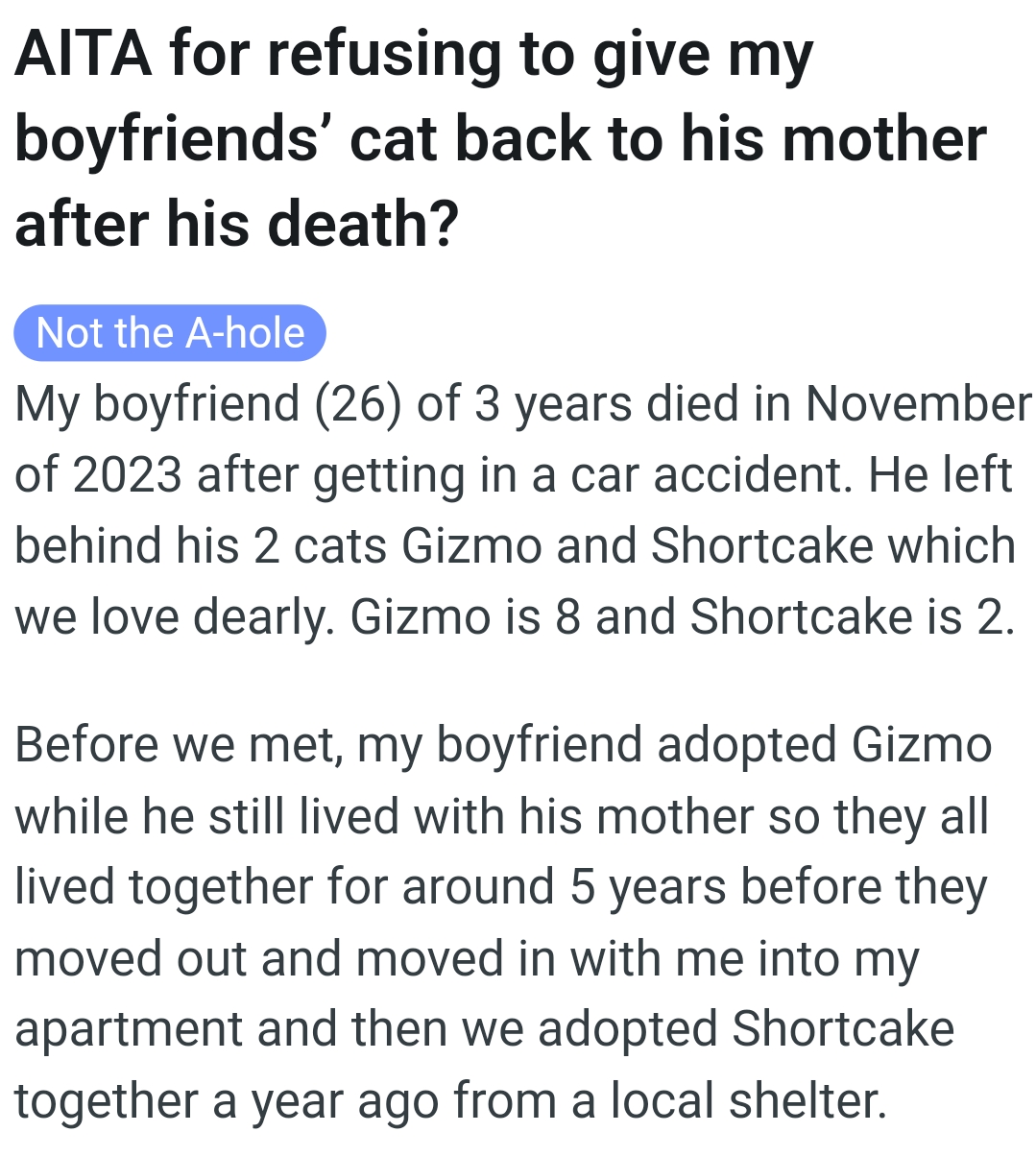
She came over for around an hour and they chatted about stuff
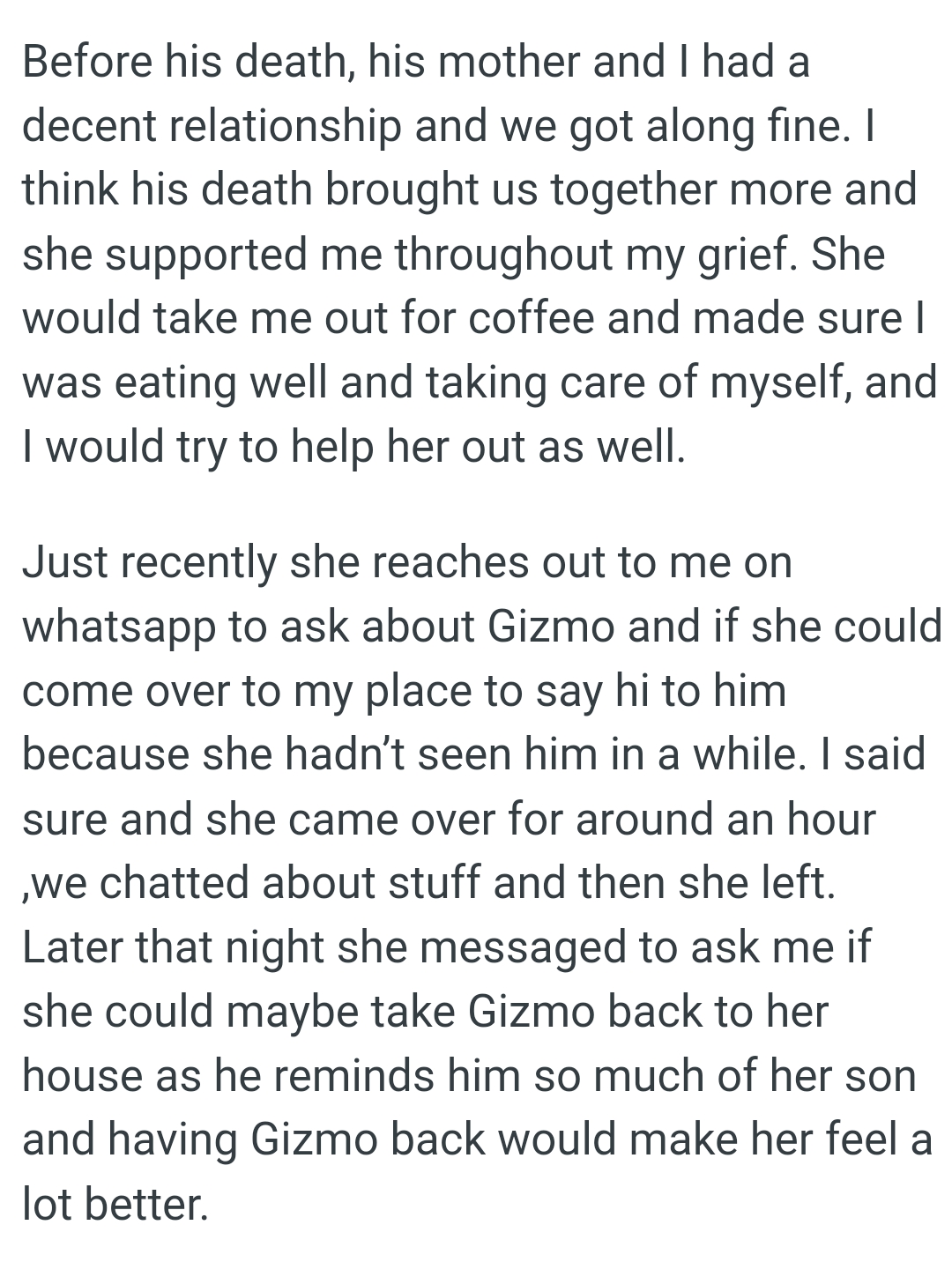
The Nature of Grief and Attachment
The emotional conflict surrounding the grieving mother and her late son’s girlfriend reveals the complexities of grief and attachment. Dr. Judith Herman, a leading expert in trauma and grief, notes that a mother’s grief is often intertwined with deep familial bonds that can complicate her reactions to others. Research indicates that attachment styles significantly influence how individuals respond to loss and interact with those who were close to the deceased.
In this case, the mother’s desire to connect with the girlfriend over shared grief may be met with frustration, as her expectations clash with the girlfriend’s emotional boundaries.
She has “more of a right to him than I do”
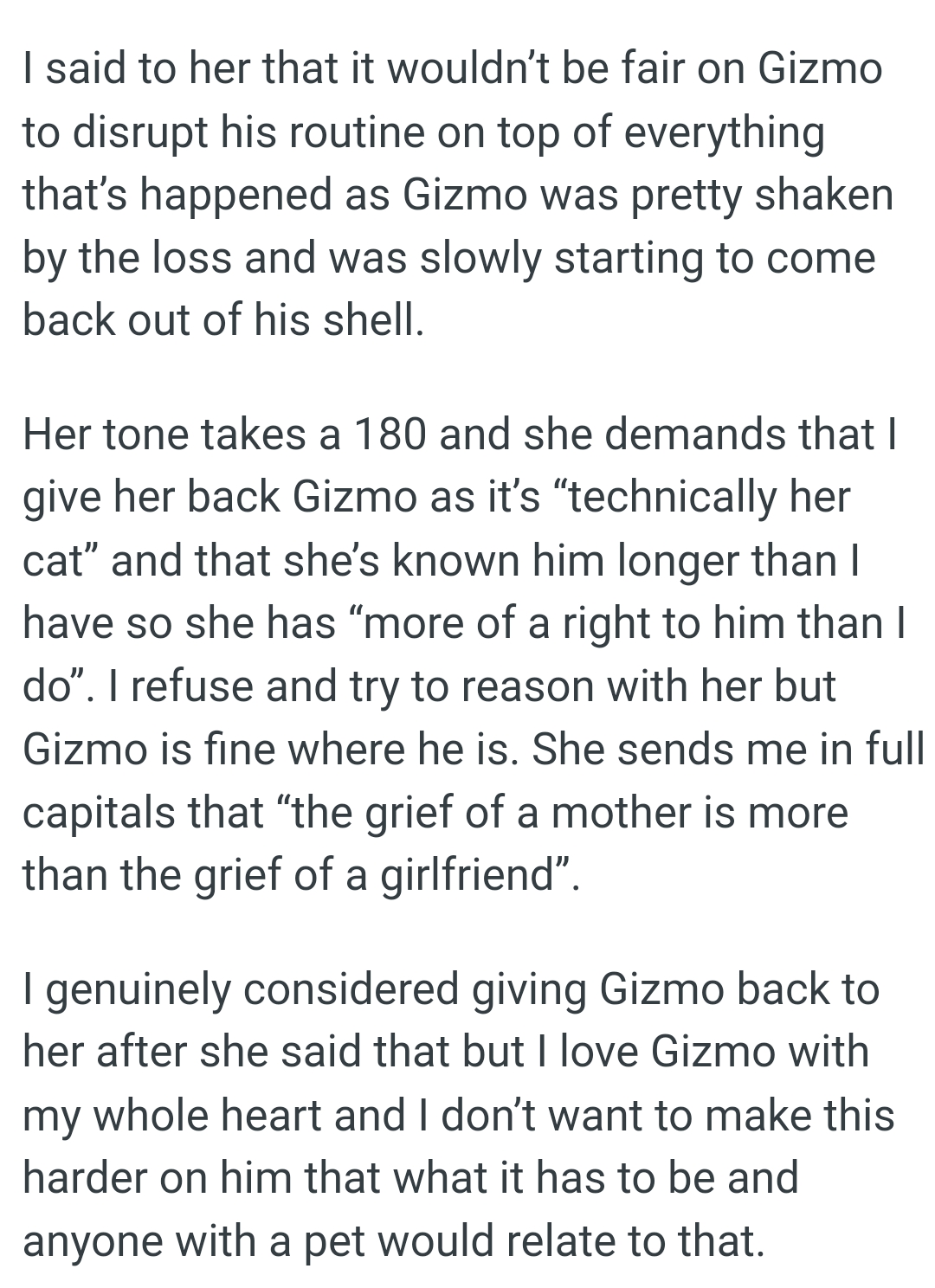
OP thinks it’s damaged their relationship to a point of no return
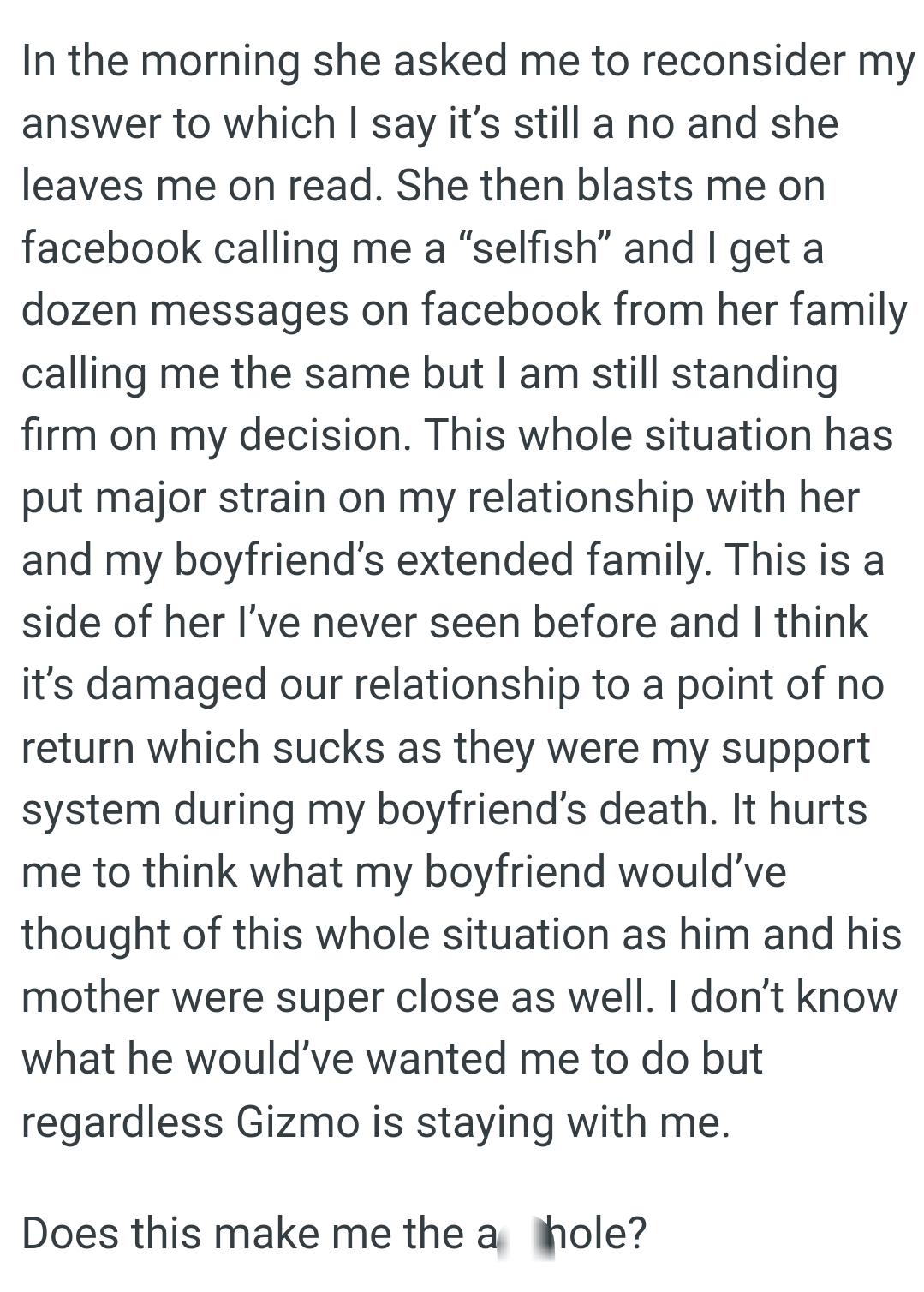
OP has offered the following explanation for why they think they might be the AH:
I decided not to give my deceased boyfriend’s cat back to his grieving mother. This could make me an AH, as she and the cat have known each other longer and may be more comfortable with each other.
I believe I might be a selfish AH because I understand her logic regarding knowing the cat for longer and that her role as his mom places her grieving feelings above mine as the girlfriend. Maybe I should have given back the cat in an attempt to salvage our relationship, but I decided against it.
And the comments roll in...
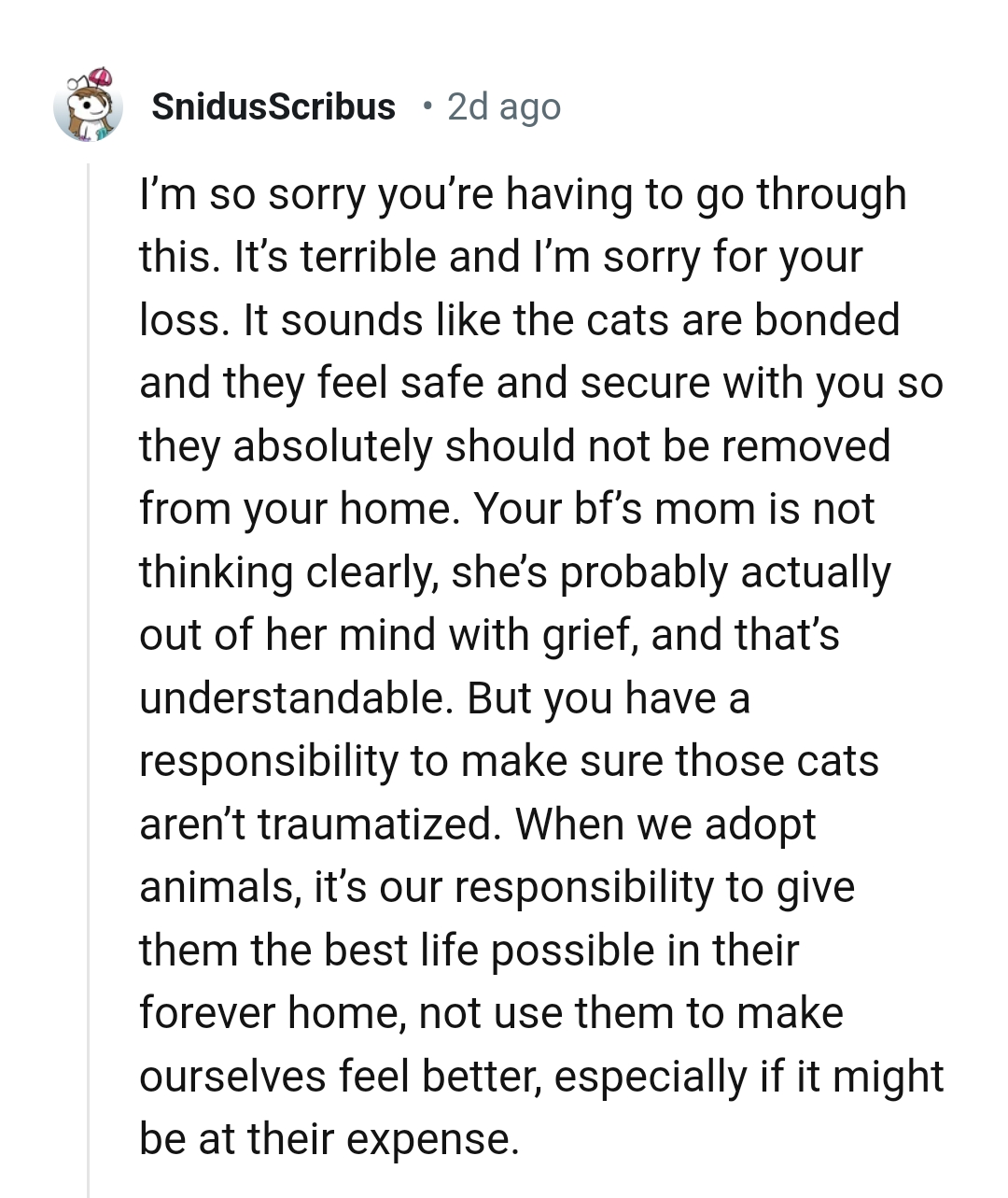
The OP should keep them together
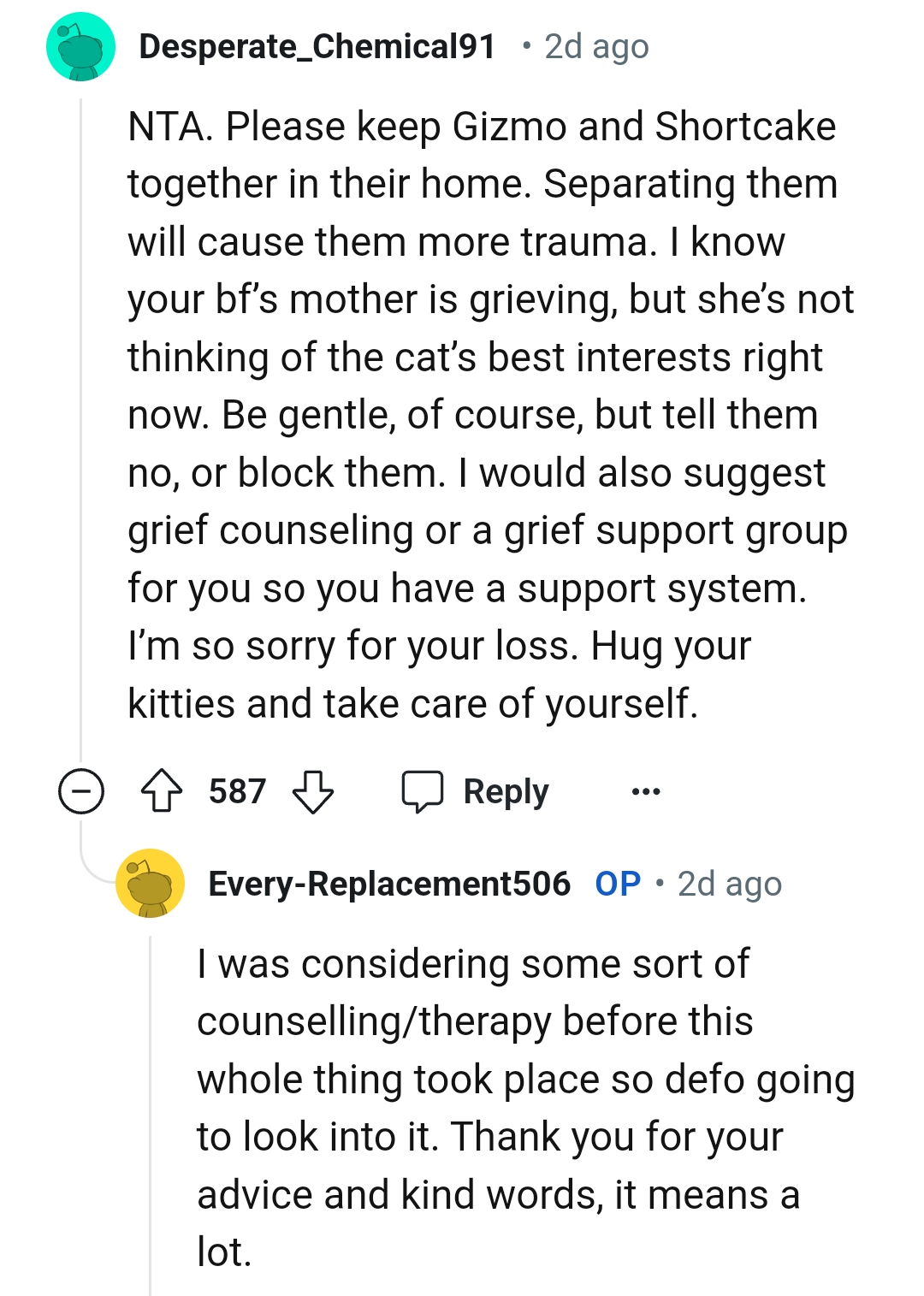
From a psychological perspective, the mother’s aggressive behavior can be understood as a manifestation of unresolved grief and a need for validation. Studies in the Journal of Abnormal Psychology reveal that individuals often lash out when their emotional needs go unmet, particularly in the context of loss. This can lead to a cycle of conflict, as the grieving individual seeks connection but inadvertently drives others away.
Did he prefer a one-cat house?
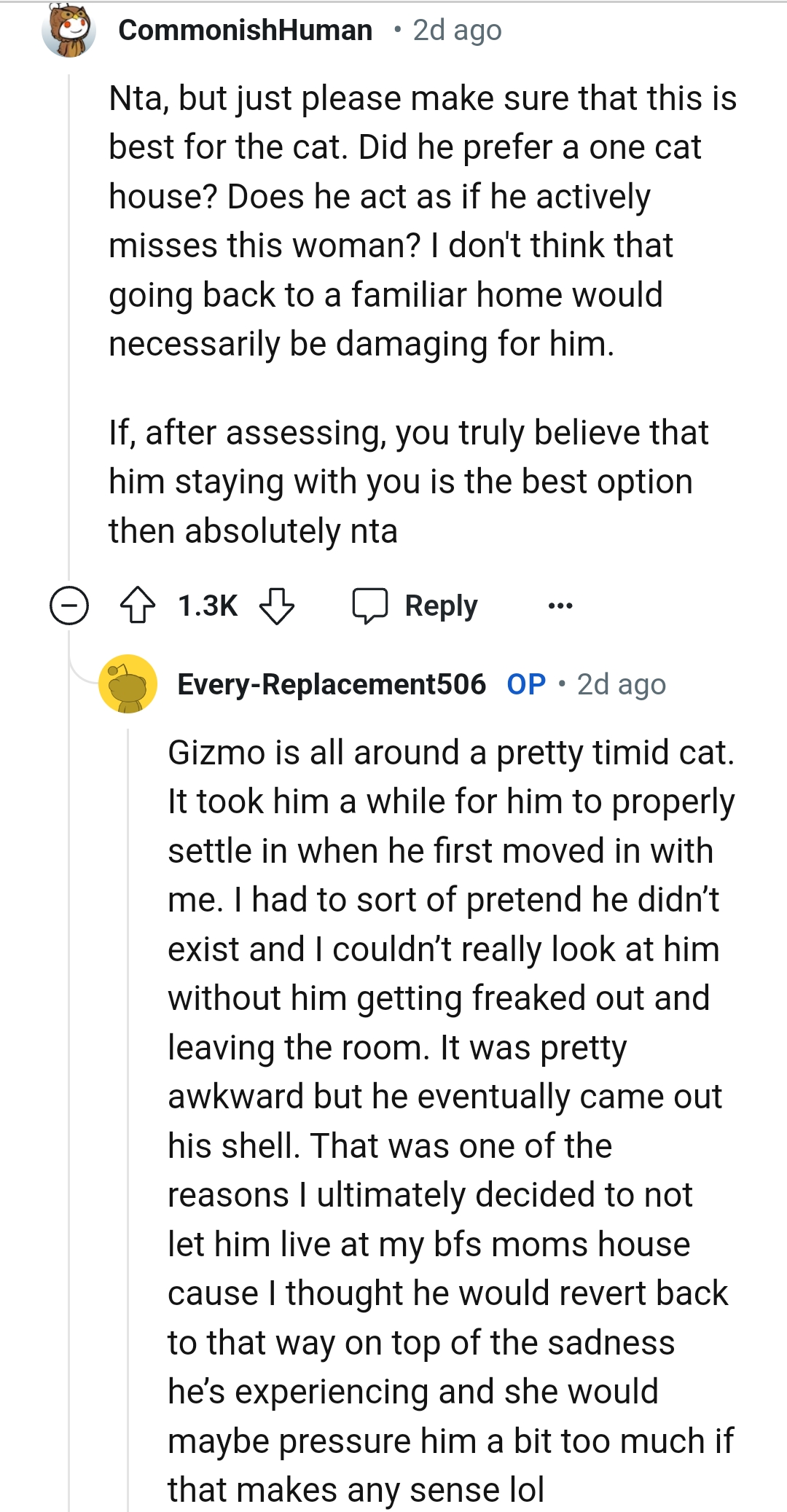
The OP should microchip the cat immediately
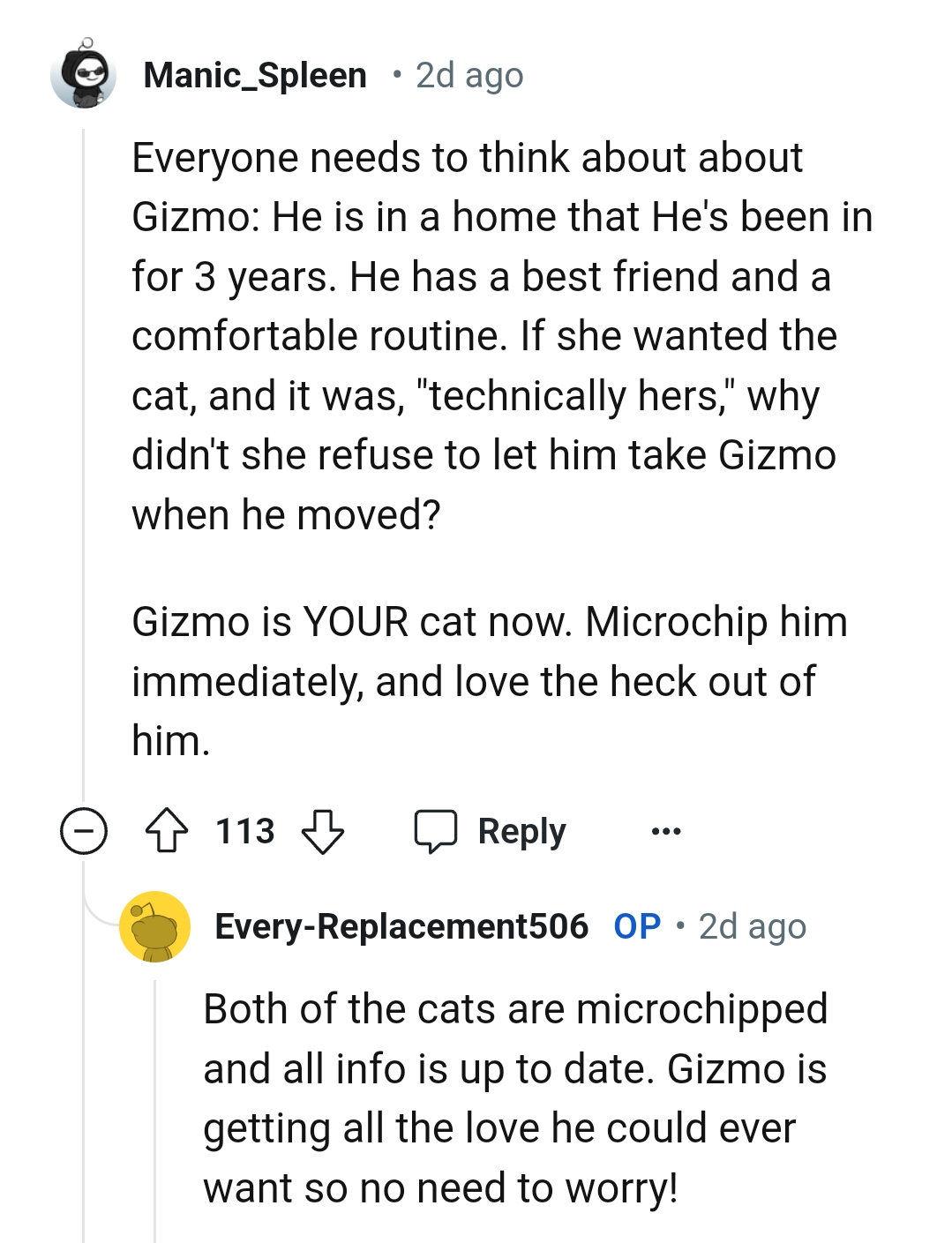
The OP left this edit later on
My boyfriend adopted Gizmo while he still lived with his mother in 2019. He and I got together in March of 2020. In February of 2023, Gizmo and he moved into my apartment with me, and we adopted Shortcake together from a shelter shortly after.
Giving the cat back is the right thing
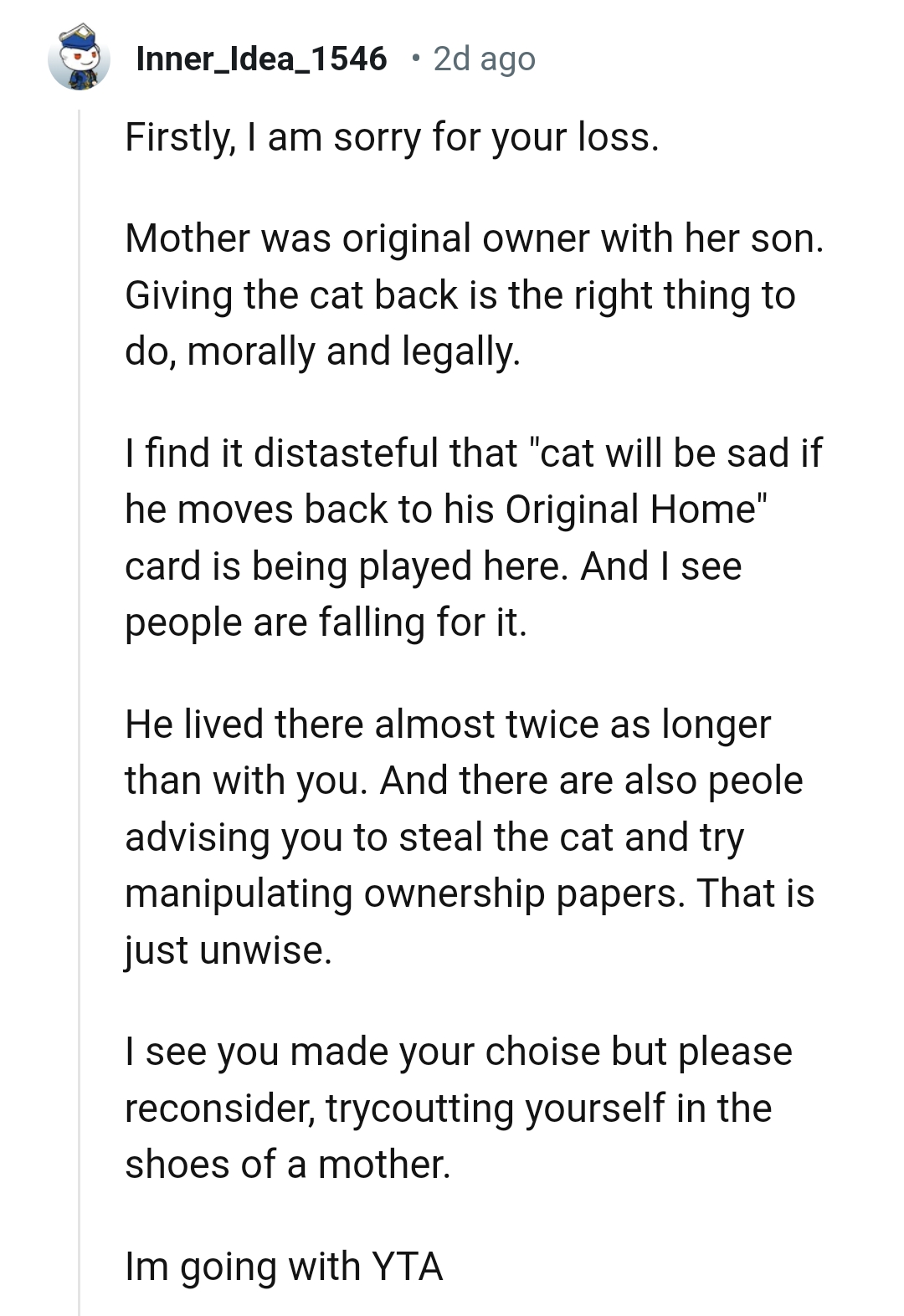
It's best for things not to change
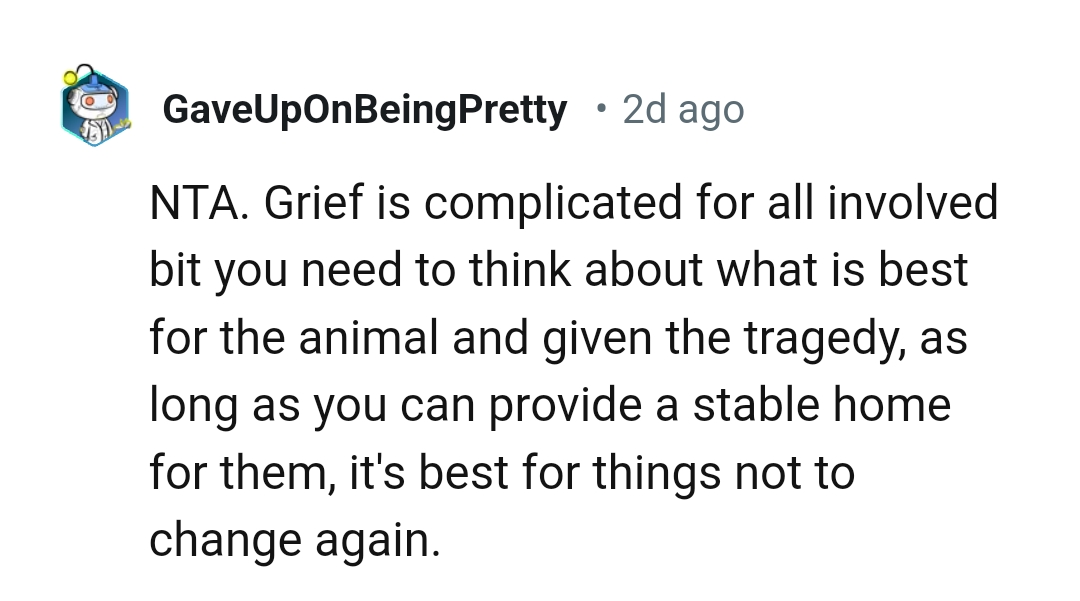
Communicating Grief and Expectations
Effective communication is crucial in navigating relationships affected by grief. Psychologists recommend that individuals express their feelings and expectations clearly to avoid misunderstandings. Research published in the Journal of Family Psychology indicates that open dialogues about grief can foster empathy and connection, allowing both parties to better understand each other’s emotional experiences.
Encouraging the mother to articulate her feelings can help her establish a more compassionate dialogue with the girlfriend, ultimately promoting healing.
Choosing what's best for the cat

OP's boyfriend would have been disappointed
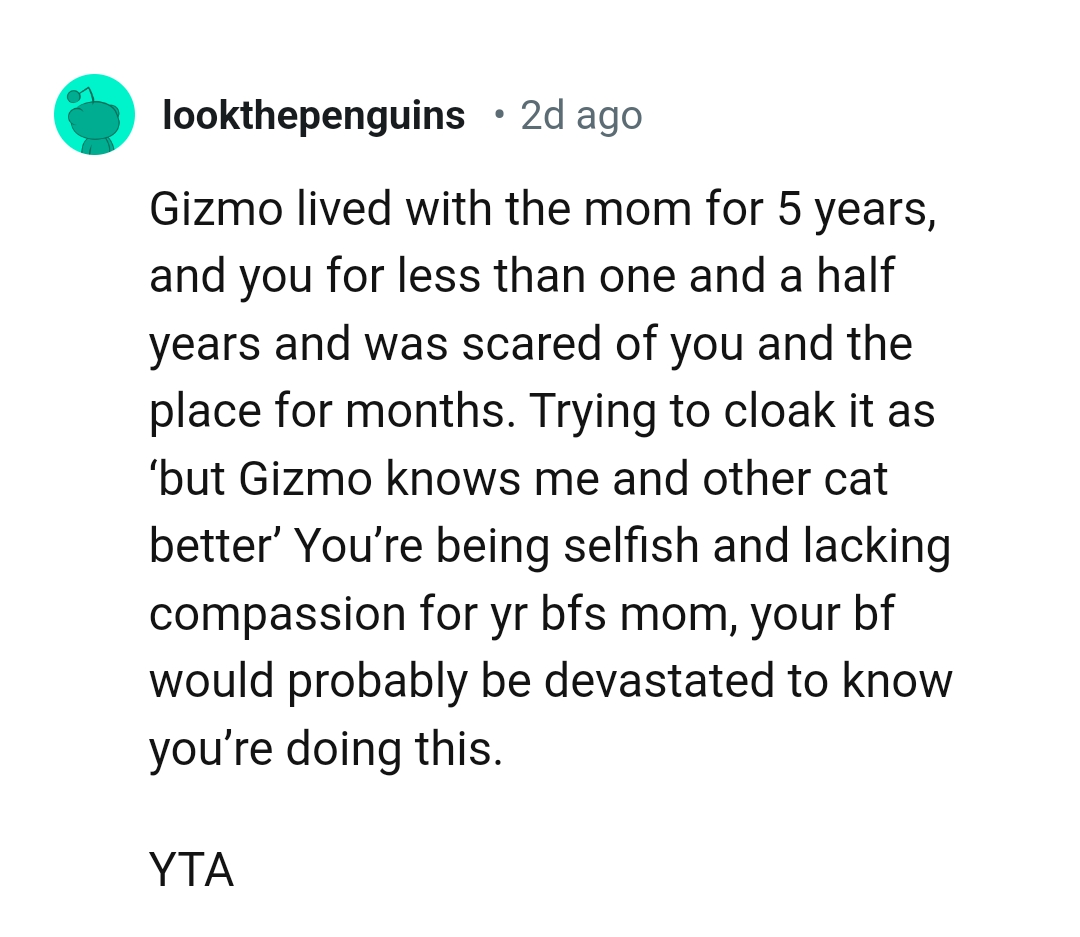
Moreover, seeking family therapy can provide a safe space for both the mother and the girlfriend to express their emotions. According to research from the American Psychological Association, family therapy can enhance communication skills and help members navigate their grief collaboratively. This approach can create an environment where both individuals feel heard and validated.
Psychological Analysis
This situation highlights the intricate dynamics of grief and attachment. The mother's anger reflects unresolved emotions that can complicate relationships. It's crucial for both parties to engage in open communication to foster understanding and empathy during this challenging time.
Analysis generated by AI
Analysis & Alternative Approaches
In conclusion, navigating grief within relationships requires sensitivity, communication, and an understanding of emotional boundaries. By fostering open dialogues and seeking professional support, both the mother and girlfriend can work towards healing. Recognizing the complexities of grief can lead to healthier, more compassionate interactions in the face of loss.
OP's sadness over her boyfriend's death has been compounded by a heartbreaking battle for custody of their pet cat. Although her ex's mother's sadness may be more profound, there is no excuse to ignore OP's sentiments or Gizmo's well-being.
Despite the backlash from her late boyfriend's family, OP is doing what she believes is best for Gizmo, and her steadfast loyalty to her cat could be the only bright spot in this difficult circumstance.
Understanding Boundaries in Grief
Recognizing and respecting boundaries is essential in relationships affected by grief. Psychologists emphasize that individuals must navigate their own grief journeys while also being sensitive to others’ experiences. Establishing boundaries can protect emotional well-being and prevent conflict, allowing for healthier interactions.
Encouraging the mother to reflect on her emotional needs and how they may impact her interactions with the girlfriend can promote a healthier relationship dynamic.



